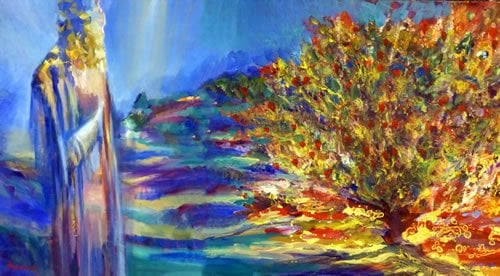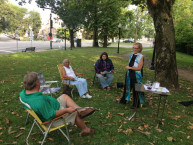 March 20, 2022: May God’s words be spoken, may God’s words be heard. Amen.
March 20, 2022: May God’s words be spoken, may God’s words be heard. Amen.
Usually, the readings we hear on Sunday are being read in churches of many denominations – Lutherans, Roman Catholics (with a few deviations), Methodists, Presbyterians, and so on – because we all read from what is called the Revised Common Lectionary (the lections meaning the readings). Well, for whatever reason, we in the Episcopal Church decided to swap out the Hebrew lesson from Isaiah this week, for the one from Exodus, and I think it perfect for us to hear. Not that I don’t love Isaiah – I do – but this story of the burning bush and Moses’ encounter with God is a timely one for all of us, given what is happening in our lives.
So, just a recap… Moses is shepherding the flock of his father-in-law Jethro Tull – kidding – Moses’ Jethro is a priest in Midian, not a 60s rock band from Blackpool England. Now, you have to understand why Moses’ is there in Midian in the first place. Taking a step back to when Moses was born, Pharoah (the King of Egypt) had decided that the Hebrew people were too numerous and too prosperous, so he told the midwives to make sure that any male born to a Hebrew woman would be killed. Nice, right?
Now the cool thing is that those women, the midwives, basically told Pharoah to kiss their…well, you know. Oh, they didn’t say it openly, but they pretended to show up too late at a birth to do as Pharoah commanded because, as they put it, the Hebrew women are just so “vigorous,” that those babies just pop right out before the midwives even get there. That’s when Pharoah decided to employ a vigilante system and command all Egyptians to kill any Hebrew male child. Seriously, this guy made Vladamir Putin look almost reasonable…okay, maybe that’s a stretch.
Anyway, Moses’ mom decided to save her son by putting him in the river in a small little basket coated with pitch to keep it afloat. This is the part everyone hears in Sunday School. Pharoah’s daughter finds it, and ta-da! – Moses is not only saved, but he grows up in the Pharoah’s palace! Now, that would all have been awesome, except unlike Pharoah, Moses has a heart, and when he sees the enslaved Hebrew people being beaten and abused, he reacts. In fact, he kills an Egyptian who is beating one of them to death.
When Moses realizes that somebody saw what happen he fled for his life (good thing too, because Pharoah was out to kill him). That is when he goes to Midian, meets his future wife at a well – it’s the local place to hang out when you want a date in those days – and he lives there happily, sort of, for many years.
And now, for today’s episode on the Moses channel, where our outlaw turned shepherd finds a bush burning and his life is changed forever. There’s a few things to note about this whole story – and you just might miss it for all the cool stuff about flames and voices of God. The first thing is that when Moses has this encounter he has stepped out of his comfort zone – beyond the wilderness the text says – to the mountain of God. The second is that he is paying attention and turns away from what he is doing to marvel at this wonderous thing of a bush burning without being consumed. The third thing is that God tells Moses he is standing on sacred ground and to remove his sandals. The fourth is what God says to him – that the great I Am IS the God of Abraham, etc. And finally, perhaps most important, is Moses’ response to God’s call to free the people from the hands of Pharoah. He said to God “Who am I that I should go to Pharaoh, and bring the Israelites out of Egypt?” Who am I indeed.
See, I think because we hear this story in Sunday School, it has become so familiar to us that we have lost the wow factor in what is happening here. We forget what this might have been like for Moses. We forget that Pharaoh was like dictators in our world now – powerful and deadly when confronted. Imagine, if you will, God telling you to go to Vladamir Putin, right up to him, and declare that his abuse of the people of Ukraine must end, and if it does not, that God will reign terror on him and on his people. How do you think that would play out? Well, we know – right? If you did that, you’d be arrested and put on a train heading to a Siberian prison. What would be your response to such a call?
We also get so busy in our lives, our necks bent over our phones as we walk about, that it is quite likely many of us would completely miss the whole fire show were it to pop up near us, so for Moses to turn aside at this wonder – well, that is nearly a miracle today in and of itself, right? To be clear – God doesn’t always engage in pyrotechnics – but God is all around us – trying to reach us. Do we notice?
For that matter, do we intentionally walk to the wild side – or really beyond it – to go beyond our comfort zone – to seek God’s presence away from all that distracts us in what is deeply unfamiliar and even dangerous?
And, do we sometimes find ourselves thinking that these encounters with God are somehow locked up in our bible, not a present day reality, but something long ago? Can we even imagine standing on sacred ground anymore?
See, I think we not only forget what this must have been like for Moses, we lose sight of it happening to each of us – because it does! Our God is a present reality – that is part of what was being said when the reply to Moses was “I am the God of Abraham, etc.” God didn’t say “I was…”. God said “I am…”. Jesus even uses this very response in a slap down of the Sadducees misunderstanding of resurrection (which is the other part of that I am statement). God is – then, now, and always.
And God is hoping upon hope that we will also will go beyond our comfort zones to a place of deep encounter – to experience relationship with God stripped from all that distracts us. To turn aside and to see the divine presence in all things. This is what we do in Lent most especially, but these journeys beyond the wilderness are always needed – not just in one liturgical season of the year. Because it is then, with our distractions set aside, in the places where we are most vulnerable, that will come to find that we are standing on holy ground, and perhaps then our hearts will be most ready to hear the call of God.
And make no mistake about it – God is calling us.
God is calling you. Every one of you.
And God yearns for us to turn aside to listen, to hear the call.
Because right now, all over the world, there are Pharaohs and the enslaved everywhere.
Right now, all over the world, God is doing miraculous things and calling us to turn aside and see, listen, and be sent to bear witness to Her unconditional love and grace.
The question we are asked to consider is will we go beyond the wilderness that lay outside our daily routines?
Will we turn aside and remove our proverbial sandals of the everyday life because we know that wherever we are on this earth, we are walking on sacred ground?
Will we push past our own insecurities and know that with God, we are capable of goodness that exceeds all our imagination, that we can, with God’s help, of bring about God’s dream for us all of the beloved community?
God sure hopes we do all these things, because today the Pharaohs of the world are persecuting the children of God.
Today people are being slaughtered in Ukraine.
Today there are many who weep at night for having been told they weren’t good enough, smart enough, pretty enough, or that their unique selves weren’t worthy of love because they were black or brown, gay, short, tall, Jewish, Muslim, overweight, trans, female, well…anything really.
Today children go to bed hungry, and mothers mourn the loss of their sons or daughters to gun violence, or unjust legal and immigration systems.
Today there are many enslaved to addictions, depression, and spiritual or emotional pain.
Today the earth, and all the creatures on it, groan from the weight and horror of our abuse and neglect.
And today… a fire is burning – but we don’t have to climb a mountain to see it. We need only look inside our hearts.
God is burning in the hearts of all the followers of Jesus, or trying to anyway. For all who follow Christ are being called in no less a way than Moses. It is a call that takes courage, faith, and great love. It is the call to love and serve Christ – to see the Christ crucified today – to be the body of Christ ready to feed the world.
We may think like Moses did, “Who am I that I should go to stand against the Pharaohs of today, and bring the enslaved out of bondage?” I would be surprised if anyone wouldn’t think that way. This is not easy work, and we can seem inadequate to the task. In fact, if one doesn’t hesitate a bit, it is likely they have no sense of the humility needed to answer the call of God. Call without “the humility grounded on truth: within oneself, in one’s relations with others, and with regard to God,”[1] well – that’s the road to hell paved with good intentions.
Perhaps that is why, if you ask nearly every person ordained in the church, each will say they resonate with one of the following call stories: Moses, Jeremiah, Jonah, Isaiah, and so on. Why? Because each of those prophets fought against it. For me, it was this story of Moses and his push back against it saying he wasn’t good enough to do this work. Truth be told, as one person said to me along the way “the church is wary of the ones who aren’t afraid,” of this call to ordained life.
But call isn’t about ordination – it is about all of us, and humility doesn’t give us an out – rather it gives us the ability to turn aside from what we have in mind for ourselves and our lives, to see something new, to recognize the holy in our midst and to remove our sense of importance when standing on sacred ground. It allows us to hear the voice of God calling us and to offer up to God our sense of unworthiness to answer that call, that we may hear and know that our faith is all that we need.
I am reminded of a story I heard once. It is about “Julia Butterfly (one suspects this is not her real name) [a] young woman who decided to hug a tree, and instead climbed a 1000-year-old redwood in California and stayed in its branches for 738 days. Living on a small platform in the treetop, she hoped to send a message about preserving old growth forests, not to speak of this particular tree she called Luna. She now has a book about her experience [titled], One Makes the Difference, in which she suggests that all of us have our own personal tree. [It] doesn’t need to be a burning tree, but she argues that if each of us takes a few steps toward something we deeply believe in, who knows where the walk, the journey, the adventure will take us.”[2]
The thing about that story is that Julia didn’t start out with a mission she created, but one that came into her heart in that moment at the foot of the tree. She didn’t start out with a grand plan, but a simple gesture of love. And, she didn’t need lots of money or things, just the belief that when she hugged Luna, that wonderous tree, she was on sacred ground – she was in a place that should be honored and loved, not cut down and destroyed, and she heard the call to climb, to sit, and to stay – and that has made all the difference.
Like Moses and like Julia, we don’t always know what a new day will bring, but every day is an opportunity to see the tree, burning or otherwise, in our midst – our God yearning to be seen and heard. And so, as you leave here today, take a moment to go where you have not been, turn aside when you hear or see something new, remember to walk humbly on sacred ground (and you are always on sacred ground), and be prepared to hear God’s call to free creation from the bonds of oppression.
You do not have to know how to speak well, or even exactly what to say, for as God made clear to Moses – this is not a solo adventure. Call is a partnership with God.
And when you feel inadequate to the task, come home here to be reassured and renewed in the Eucharist and in the fellowship of community, enter into divine conversation in daily prayer, and remember always these words of God…
“I will be with you.”
Amen.
For the audio, click below, or subscribe to our iTunes Sermon Podcast by clicking here (also available on Audible):
[1] Bernard of Clairvaux
[2] homilieticsonline
The Rev. Diana L. Wilcox
Christ Church in Bloomfield & Glen Ridge
March 20, 2022
Lent 3 – Year C
1st Reading – Exodus 3:1-15
Psalm 63:1-8
2nd Reading – 1 Corinthians 10:1-13
Gospel – Luke 13:1-9




